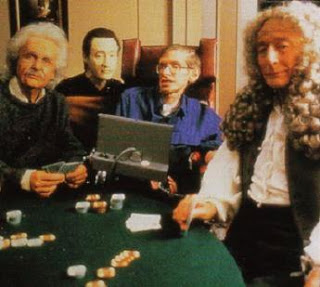That has got to be one of the top WTF moments of my life to date. A delightfully cruel bait and switch if ever there were one. (Although in fairness to whoever it is I should be annoyed with, clearly this was not a secret to everybody; Peterson clearly had a huge cheering section in the audience and they all seemed to have better seats than me. And I bought a couple of days after the tickets went on sale. Perhaps there's a disclaimer woven into the beard hairs in the poster.)
I've been aware of Matt's work for a number of years and even supported it through much of his stint on Patreon. He is an incredibly articulate and informed critic of religion in the US and in general. And he's a powerful personality on stage as part of a debate, so I thought a magic show could have been great. Turns out a magic show with no tricks... not so great.
I suppose what leaves me annoyed is knowing that I gave money to see Jordan Peterson live. Which I almost but don't quite regret doing because in a perverse way I kind of like him.
Quick back story. Jordan Peterson is a UofT Psychology Professor who rose to internet stardom a year and a half ago for criticizing a piece of Canadian legislation, Bill C-16, which related to the human rights code and how gender pronouns needed to be used. Once you get over the fact that he's an utter asshole and not shy about calling people he disagrees with names, (post modernist neo marxist seems to be his favourite,) he can make a lot of sense and sound like a very insightful person. But he also believes a lot of stuff which is clearly nuts.
And unfortunately, the evening was spent on the nuts parts... and how!
The problem I have with Peterson is that he lives in two worlds. As a clinical psychologist, he speaks the language of empirical science, citing data and studies and offering up what appear to be evidence-backed methods for making your life better. (Everything I've read about his most recent book, 12 Rules for Life, suggests that it's reasonable in this way.)
But the other world is one of metaphor and myth. This is the world where you might be able to say something like even if everything sprang entirely out of a man's imagination, "Shakespeare contains Truth." (In Peterson's case, it seems to be a obsessive reverence for Dostoyevsky.) And if that's what your definition of "true" is going to be, you cease to be a reliable source of insight about the world. Matt tried very hard to get yes/no answers to specific questions about what he believed was "real" and got a mixture of evasion and word salad. This is why he has been called the "Deepak Chopra of Christianity".
And I'm conflicted, because I seem to agree with what he has to say, but his body of output as a whole is so inconsistent that I could never responsibly say to someone "Go Check out what Jordan Peterson has to say about this," for fear they got lost down the rabbit hole of myths and dragons. There are better sources for that kind of insight.
But one this is clear. On a Friday night, I really would just have rather watched card tricks.
Update April 30, 2018
Matt Dillahunty has posted his own (lengthy) response to the conversation on his YouTube Channel:






